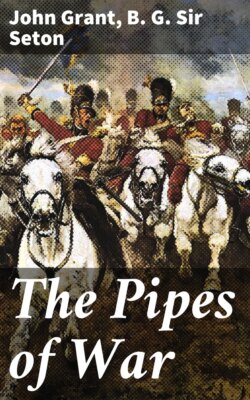Читать книгу The Pipes of War - John Grant - Страница 12
На сайте Литреса книга снята с продажи.
MESOPOTAMIA
ОглавлениеTable of Contents
Playing the pipes in the Golden East is a far greater effort than it is at home, and every piper who has soldiered there knows how the heat and the dryness of the atmosphere affect his bag and reeds. But the cult of piob mhor thrives east of Suez, and at least as much enthusiasm is shown by regiments stationed in India as in a home station.
And when Scottish troops were called upon to take their part in the Mesopotamia operations, we find the pipes as prominent a feature in the fighting as they were on the Western front. At Sheikh Saad on 7th January, 1916, the 1st Seaforths—the "Reismeid Caber Feidh"—were played to the attack across absolutely open ground by their Pipe Major Neil M'Kechnie and other pipers. An officer who was present describes the incident as follows:
"As we advanced over the dead flat open desert the Turks suddenly opened a very heavy fire from well concealed trenches at a range of from 600 to 800 yards. The battalion immediately advanced by rushes towards the enemy's position in spite of very heavy initial losses. Foremost among the men was our acting Pipe Major, M'Kechnie, who immediately struck up the regimental charge or 'onset,' 'Cabar Feidh.'
"His fine example as well as his music had a remarkable effect on the men at such a critical moment. He was shortly afterwards wounded, and had to drop behind as the lines went on."
In the same action the 2nd Black Watch were played in by their pipers just as they had been on many previous occasions in France. In the act of playing Corpl. Piper MacNee was mortally wounded. This brave man had been wounded before at Mauquissart and awarded the Distinguished Conduct Medal. The Pipe Major, John Keith, was awarded the D.C.M. for "gallant and distinguished service throughout the operations."
